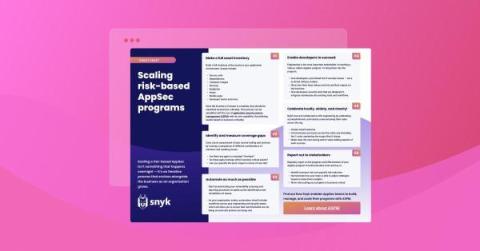Security | Threat Detection | Cyberattacks | DevSecOps | Compliance
Vulnerability
CVE-2023-22515: Critical Privilege Escalation Vulnerability in Confluence Data Center and Server
CVE-2023-20101: Critical Authentication Bypass Vulnerability in Cisco Emergency Responder
2023 OWASP Top-10 Series: Wrap Up
Over the past several months, we've taken a journey through the new 2023 OWASP API Security Top-10 list. In the previous 12 weekly posts, we've delved into each category, discussed what it is, how it's exploited, why it matters, and suggested effective protections for each. Now, as we conclude this series, it's time to summarize and offer some practical guidance for security practitioners looking to bolster API security in their organizations.
6 steps for scaling risk-based AppSec programs
Scaling a risk-based AppSec program involves adapting your security practices to accommodate the growth and evolving needs of your business, while effectively managing and mitigating security risks.
HTTP/2 Rapid Reset
A recent vulnerability tracked as Rapid Reset (CVE-2023-44487) in the HTTP/2 protocol was recently disclosed by researchers and vendors. It was exploited in the wild from August 2023 to October 2023. The issue arises from the HTTP/2 protocol's ability to cancel streams using an RST_STREAM frame, which can be misused to overload servers by initiating and quickly canceling numerous streams, circumventing the server's concurrent stream limit.
CVE-2023-38545: High Severity cURL Vulnerability Detection
On October 11 a new version of curl (8.4.0) was released, where a couple of new vulnerabilities were fixed (CVE-2023-38545 with severity HIGH and CVE-2023-38546 with severity LOW). These issues were previously announced in the project’s discussion. At the time of this blog, there have been several proof of concepts released for CVE-2023-38545 which result in crashes, but not exploitation.
Detecting vulnerable curl and libcurl versions with Black Duck SCA | Synopsys
Cato's Analysis and Protection for cURL SOCKS5 Heap Buffer Overflow (CVE-2023-38545)
TL;DR This vulnerability appears to be less severe than initially anticipated. Cato customers and infrastructure are secure. Last week the original author and long-time lead developer of cURL Daniel Stenberg published a “teaser” for a HIGH severity vulnerability in the ubiquitous libcurl development library and the curl command-line utility. A week of anticipation, multiple heinous crimes against humanity and a declaration of war later, the vulnerability was disclosed publicly.











